#Семнадцать мгновений весны
Text
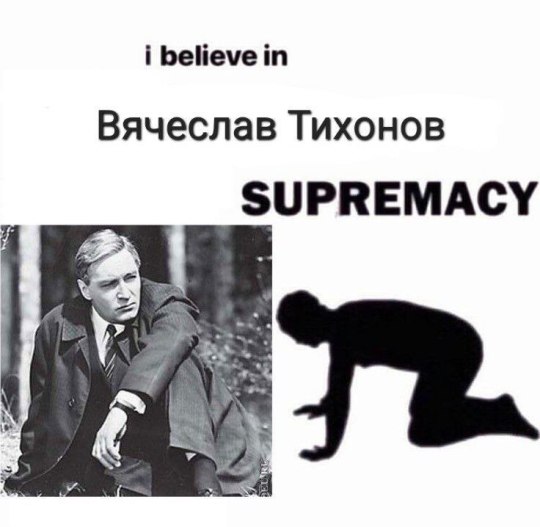
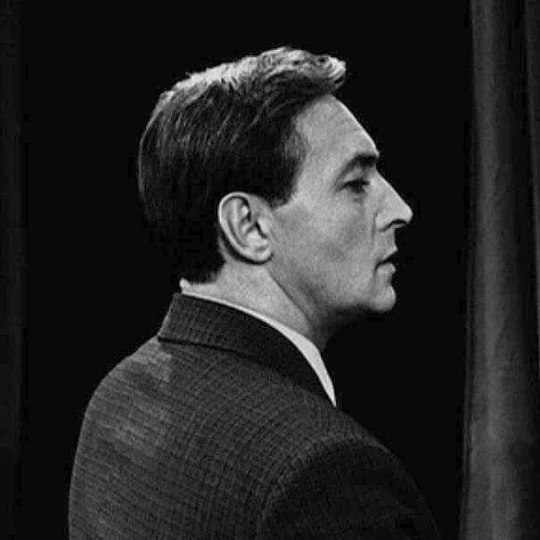
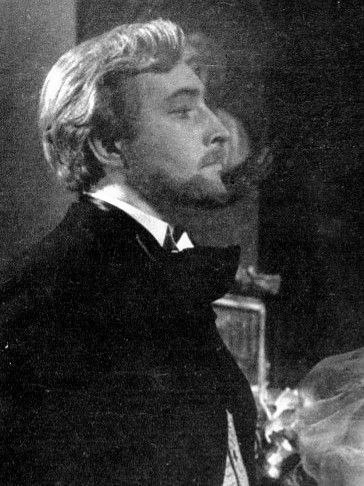
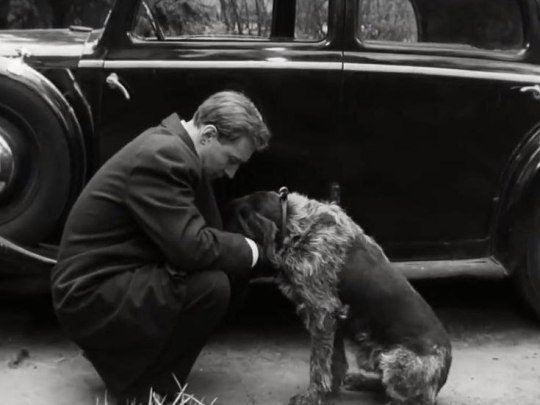
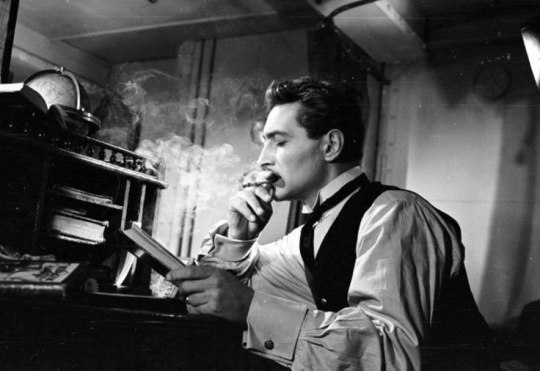
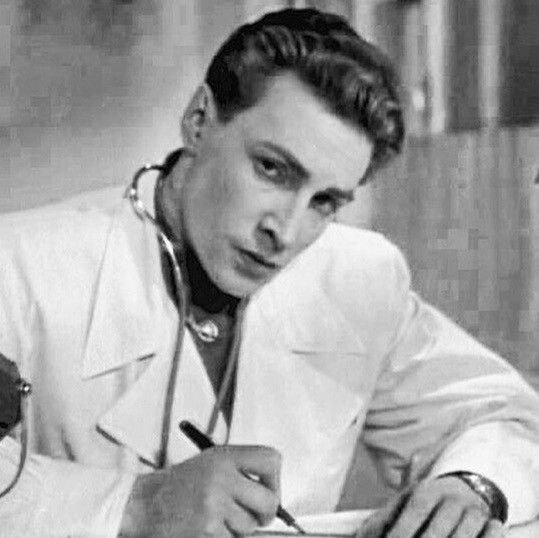
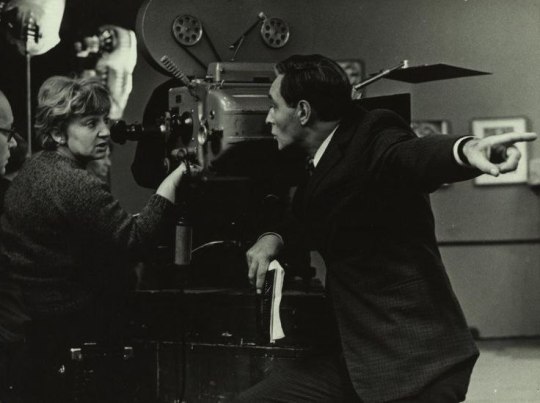
это мой муж
24 notes
·
View notes
Text

Art by Bucko Pakoo
Commissioned by me
#Семнадцать мгновений весны#Штирлиц#seventeen moments of spring#max otto von stierlitz#heinrich muller#walter schellenberg
11 notes
·
View notes
Text

16 notes
·
View notes
Text

#seventeen moments of spring#max otto von stierlitz#stierlitz#семнадцать мгновений весны#макс отто фон штирлиц#штирлиц
50 notes
·
View notes
Text
«Самые счастливые люди на земле те, которые могут вольно обращаться со временем, ничуть не опасаясь за последствия».
Цитата из сериала "Семнадцать мгновений весны"
#цитаты#цитата#мудрыемысли#мудрость#семнадцать мгновений весны#русский tumblr#на русском#мысли в блог#психическое здоровье#счастье
9 notes
·
View notes
Text

My beloved babies
#soviet actors#seventeen moments of spring#oleg tabakov#vyacheslav tikhonov#семнадцать мгновений весны#walter schellenberg#штирлиц
5 notes
·
View notes
Text
AHAHA spent some time playing around with that new anime AI and made kawaii stierlitz (yes. don’t ask me why. i just had to)

#good god he is so young here#anime stierlitz. now you’ve seen everything#seventeen moments of spring#семнадцать мгновений весны#специально ставлю тэг для русскоязычного тамблера ребята вы должны это видеть
10 notes
·
View notes
Text
Seventeen Moments of Spring (1973): a review
Here is the non-spoilery review/introduction/recommendation I promised.
For many of us living in the post-Soviet states, this title needs no introduction. It’s impossible to remember how old I was when I encountered a Stierlitz joke for the first time — elementary school age, maybe earlier? What I didn’t realize was that the show had become such a hit not just because of its effective mythmaking or because the hero is absurdly badass, though both of these things are true. It is also genuinely brilliant TV that stood the test of time with ease.
Seventeen Moments of Spring turns 50 in a few months. That means that as good as the show is, it is of course also dated in several ways. The most noticeable is the pacing. This show was made for an entirely different attention span in mind. It’s not a problem of a slow start — the stakes are established within the first episode. But every individual scene takes more time than it would have taken in a modern show, and the addition of real newsreel footage slows down the action even further.
Another thing that is noticeable to the modern viewer is how gendered the story is. The nigh-untouchable (to a certain extent — no spoilers!) protagonist embodies pretty much every masculine virtue you can think of, and selflessly sacrifices his feelings for patriotic duty. There’s only one prominent female character, and she is given the opposite role: more vulnerability, more raw emotion, less opportunity for dashing heroism. The show’s director is a woman, and this might rightfully be a factor in you deciding to watch this show — but don’t let that give you false hopes for a feminist narrative.
The show is an adaptation of a single novel in a series, and that has certain effects on the plot. One of them is a huge benefit compared to what saturates the modern pop culture: the show wastes no time on establishing an origin story, opening in the final months of the war with all pieces already on the board. The main plot was perhaps better suited for a book format: I found it convoluted and difficult to follow, especially when the voiceover narration didn’t offer extra explanations. By the way, the show’s method of information delivery also needed getting used to: for me, plot developments were often confusing upon first introduction, and became clear as they were explained later.
But you don’t need to know anything about the plot beforehand. I didn’t. I was only aware of the premise — a Soviet spy in deep cover in Nazi Germany — and that was probably the perfect amount of knowledge. My viewing experience was a strange version of a completely fresh unspoiled first viewing where I had to guess where the plot was heading and concentrate hard on following it, except I’d known the protagonist’s name since childhood and so had to simultaneously observe another process: how it slowly ceased to be the name of just the joke character and became the name of a dreamy angsty hypercompetent hero I was forming an emotional attachment to.
One of the main factors of the show’s success are the attraction and sympathy the main character inspires despite — or, rather, because of — his emotional unavailability. The creators understood the appeal of a handsome man who is not only very good at his job but also represses his true self and creatively adapts it to the environment just as clearly as any modern day fangirl does. He is in tight control of not only his actions but also every emotion he allows to reach his face. The actor’s expression barely changes even in the most open, unguarded moments. And yet the hero’s exhaustion, loneliness, and homesickness are effectively conveyed with the help of the iconic music in the long, slow scenes, achieving the lyricism that became one of the most memorable aspects of the show.
Don’t look for historical accuracy here. According to several researches referenced by the Wikipedia article, the setting was more of a reflection of the USSR than a faithful depiction of the Third Reich. I assume that watching this will give you more insight on Soviet culture than on WWII.
You might want to check out this show if you are interested in:
hypercompetent protagonists
also very competent antagonists who act like three-dimensional humans and not evil cardboard cutouts
men who are emotionally repressed almost to the breaking point
Stoic Masculine Angst™
political intrigue and spy mind games
the unrelenting tension of working against some of the most dangerous people on the planet right under their nose
all sorts of people living in a totalitarian state, the roles they have chosen to play in it, and how they act when they know its days are numbered
excellent acting
black and white cinematography, intentionally chosen over color for stylistic reasons
beautiful theme music
On the other hand, here are some things that you might want to be aware of. The pacing is slow, the plot demands attention, and the material is often heavy — so it’s more of a “slow journey over 2-4 weeks” show than a “binge in two days” one. For me, the episodes usually took more time to watch than their actual runtime, and left me exhausted — and I suspect I’m not the only one. Important content warning: one of the episodes shows real concentration camp footage; you can notice when the narration starts going in that direction and prepare yourself. There are also scenes of physical and psychological torture inflicted on people of various ages starting from a very small child; they’re not gory but still disturbing. Some other scenes I found hard to watch because of how suspenseful they were. On the flip side, you might find the black uniforms and cars a tad too sleek and fashionable, and there are characters based on real Nazis who are written and played charismatically enough that you might be surprised by how happy you are to see them on screen. Don’t even try to apply any modern Western standards of representation, obviously — not only because the show is half a century old but even more so because of the setting. Ignore the colorized version if you encounter that, watch the black and white original.
Finally, I can’t not mention why I suddenly decided to watch this classic after having zero interest in it throughout my entire life. The last few months of 2022 were brightened for me by two works of fiction:
A star-filled, stylish cult 1973 drama about a Russian man in a violent Western European environment, featuring a time/clock motif and a major female character named Katya
A 12-episode TV show about the fight against fascism, notable for portraying the antagonists as humans as opposed to one-dimensional evil caricatures, and likely to irritate some viewers with its slow pacing
I started watching Seventeen Moments of Spring because it was a classic antifascist espionage TV show from 1973, and was amazed to discover that it also shared all other features listed above. It’s not often you watch something at just the right time mostly by coincidence! Shout out to the film that is definitely real and the show that might be a fandom’s collective fever dream (or is that the other way around?) for bringing me here.
5 notes
·
View notes
Text
Семнадцать мгновений весны
Песня о далёкой Родине
⭐
Seventeen Moments of Spring
Song about a distant homeland

34 notes
·
View notes
Text
Винк на телевизоре долбанулся и заставляет меня платить за просмотр "Семнадцать мгновений весны" , хотя тут подписка ... Собака сутулая . Я щас его перезагружу нафиг
3 notes
·
View notes
Photo
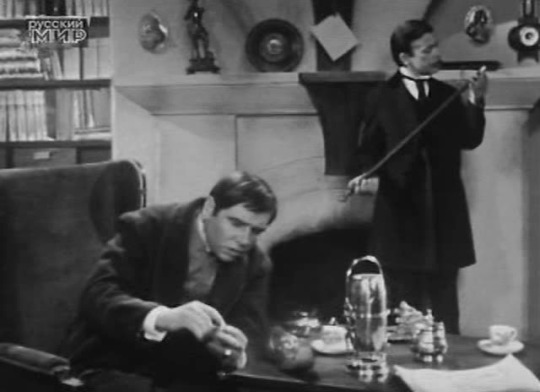
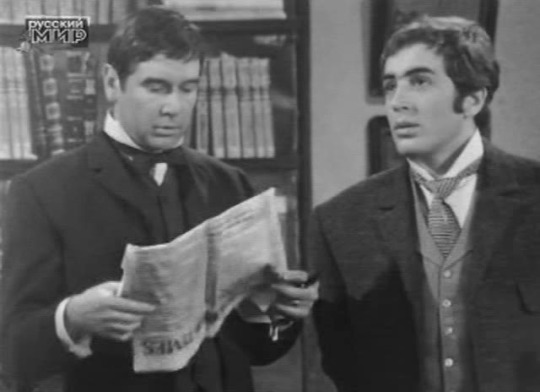
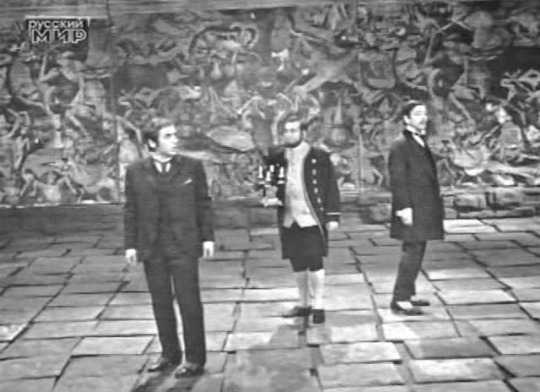
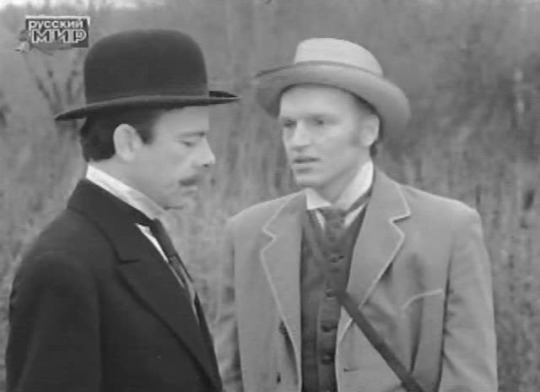
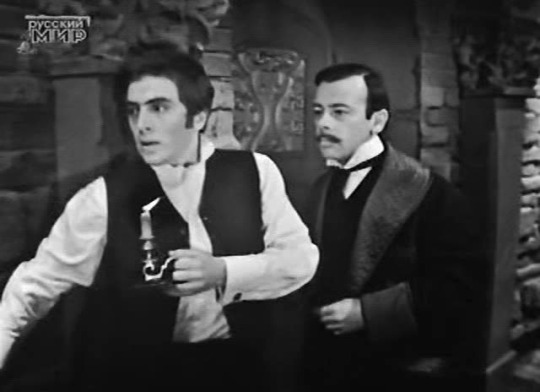
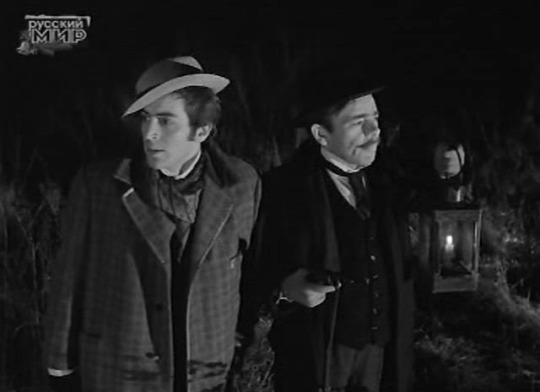
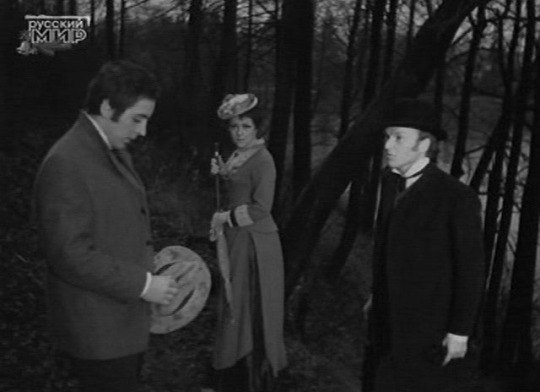
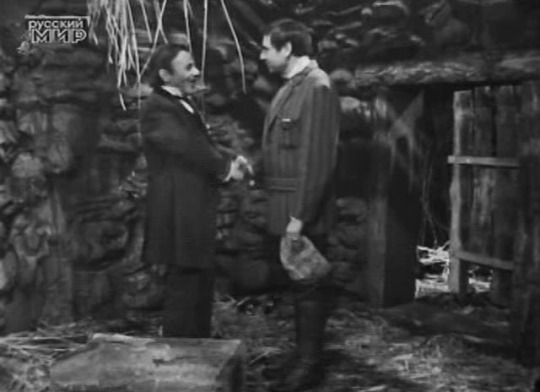
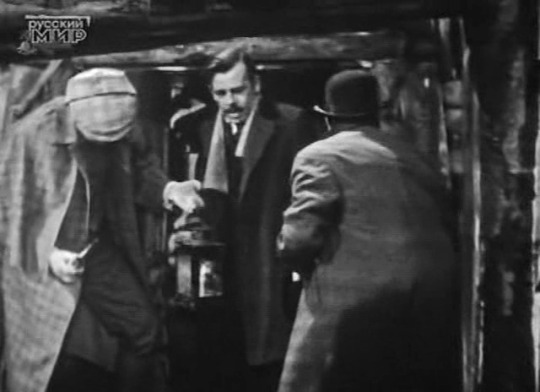
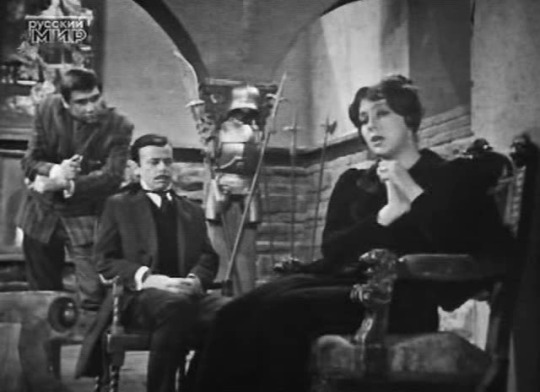
Собака Баскервилей (1971)
Помнится, лет десять назад я был крайне удивлен, узнав о существовании еще одной советской “Собаки”, но в то время так и не посмотрел ее. Но хронометраж в два с половиной часа хотя бы намекал на то, что здесь не будет лишних урезаний и выпластывания целых сюжетных линий. Все-таки есть где развернуться. И возможно это была бы отличная адаптация “Собаки Баскервиллей”, если бы не одно, большое НО - здесь совершенно неказистый, отстойный Холмс. На его фоне Холмса Ливанова просто шедевр. У него неприятное мягкое лицо, невнятная речь, иногда возникает ощущение, что текст он читает с грехом пополам с телесуфлера. О какой-то актерской игре и речи не идет. К счастью, это “Собака”, а значит, Холмс здесь только в начале и в конце. Поэтому я больше не буду про него писать, лучше напишу про сам сюжет, атмосферу и других актеров, которые играли вполне достойно.
В первую очередь затрону сам сюжет. В этом плане у фильма все отлично. Здесь была даже линия “три оборванные нити”, пусть и с некоторыми изменениями - Холмс и Уотсон не покидали Бейкер-стрит, поэтому слежку из кэба они увидели из окна, да и Картрайт, который тут один из беспризорных мальчишек, пришел к ним домой за поручением. Такая камерность обусловлена тем, что это телеспектакль, да еще и наверняка с крайне ограниченным бюджетом. Но меня это не очень обеспокоило, я только надеялся, что болота в том или ином виде будут в итоге присутствовать. В остальном же это почти дословная экранизация, шпарят прямо по книге, никаких отхождений от канона. Разве что полностью выкинули Фрэнкленда (но оставили Лору Лайонс), так что Уотсон узнал о “убежище” на болоте не от Фрэнкленда, а от Бэрримора. Сама собака, большая и черная, была в общем-то мельком и только на стоп-кадре можно увидеть, что ее морда немного измана чем-то, больше похожим на мел, чем на фосфор. А еще ее прятали где-то в шахте на болотах, а не в заброшенной хижине.
А теперь перейдем к актерскому составу. Уотсон получился вполне сносный, мне понадобилось немного времени, чтобы привыкнуть к его манере говорить и играть, но в целом получился достойный Уотсон, который вполне вытягивает на себе “Собаку”. Впрочем, вытягивает на себе он не только девонширские сцены, но и сцены на Бейкер-стрит, ведь Холмс здесь никакущий. Мортимер тут проходной, зато сэр Генри мне очень понравился. Приятно для разнообразия увидеть не клоуна Михалкова, а более книжную версию баронета. Играет его, кстати, Олег Шкловский, Джеки Чесней из “Здравствуйте, я ваша тётя!” И играет весьма хорошо, его дуэт с Уотсоном получился просто прекрасный. Бэрримор тут, кхм, довольно странный, одетый скорее по моде семнадцатого века. Больше ничего сказать про него не могу. Зато Степлтон тут Кайдановский, и, пожалуй, этот Степлтон у меня будет на втором месте (на первом, конечно, Янковский). Бэрил тут весьма и весьма миловидная, черноволосая барышня aka радистка Кэт (нет, “Семнадцать мгновений весны” я все еще не смотрел). Есть тут также и жена Бэрримора, и Селден, и Лора Лайонс, но про них я писать ничего не буду, ограничившись основным кастом.
Но самое главное здесь - это атмосфера, вполне готическая и пугающая. Сам Баскервиль-холл выглядит, конечно, как дешевая декорация, с просто ужасающе неровными полами (эти огромные камни, кстати, предательски скрипят под ногами), но это неплохо играет на общее настроение. Так что здесь это в действительности триллер, хоррор, мистика и прочее, прочее. Экспериментальная музыка на фоне тоже неплохо влияет на атмосферу (при этом в сценах на Бейкер-стрит музыкального сопровождения не было никакого и я успел разволноваться). Правда, на начальных и финальных титрах играет какая-то развеселая мелодия а ля цирк или шарманка, что меня скорее насмешило.
Пришла пора подводить итог. Могу сказать, что это одна из самых полных и точных экранизаций “Собаки Баскервиллей”, с отличной готической атмосферой и неплохим кастом. Главный и жирный минус - это, конечно, Холмс, и на него глаза закрыть никак не получается. Интересно, что этот же Волков ранее сыграл Холмса еще в двух телеспектакля, но они не сохранились и я, честно, не знаю, радоваться или сокрушаться по этому поводу. Так что между двумя советскими “Собаками” я скорее выберу версию 1971 года, чем более популярную и известную версию 1981 года, где по атмосфере огромный неуд. Однако Ливанов, как ни странно, лучше Волкова, вот не ожидал.
2 notes
·
View notes
Text

Art by Củ Lỏ
Commissioned by me
#Семнадцать мгновений весны#Штирлиц#seventeen moments of spring#max otto von stierlitz#heinrich muller#walter schellenberg
11 notes
·
View notes
Photo
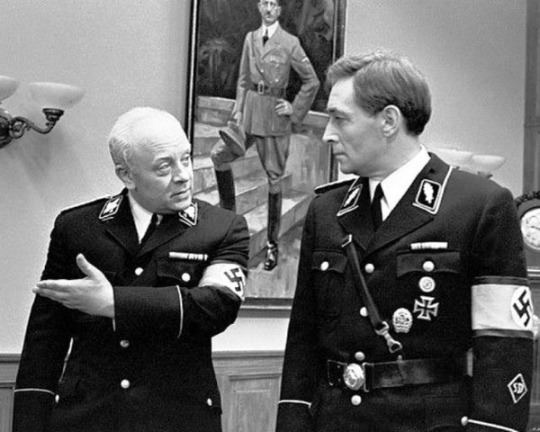
Фильм, который смотрели все, наградил КГБ
11 августа 1973 года центральное телевидение СССР начало показ фильма Т.Лиозновой "Семнадцать мгновений весны", поставленный по роману Юлиана Семенова.
В течение двух недель были показаны 12 серий, навсегда связавшие актеров с их персонажами, а Штирлиц и шеф гестапо Мюллер в исполнении Вячеслава Тихонова и Леонида Броневого соответственно сразу обрели культовый статус.
Военная драма о советском разведчике, внедрённом в высшие эшелоны власти нацистской Германии, снималась с 1971 по 1973 год. Показ фильма должен был начаться ко Дню Победы в мае 1973 года, но был отложен по политическим соображениям, из-за визита в эти дни советского лидера Леонида Брежнева в ФРГ. Первую серию картины зрители увидели 11 августа 1973 года. Фильм приобрёл широкую популярность в Советском Союзе уже во время премьерного показа, в связи с чем повторный показ состоялся уже через три месяца.
Подробнее: https://asbest-gid.ru/news/film_kotoryj_smotreli_vse_nagradil_kgb/2022-08-11-34999
4 notes
·
View notes
Text
Вячеслав Тихонов в фильме «Семнадцать мгновений весны», 1973
4 notes
·
View notes
Text
Топ 3 моих любимых анекдота про Штирлица
(Ахахахахахаха,
извините, это настолько не похоже на то, что я обычно публикую, что мне стало от этого смешно).
3.
Ночью Штирлиц шёл в Дрезден с трудом разбирая дорогу.
Наутро железная дорога от Берлина до Дрездена была полностью разобрана.
2.
В окно дуло.
Штирлиц закрыл окно.
Дуло исчезло.
1.
Двое постучали в дверь
"ССовцы" - подумал Штирлиц
- Извините, Штирлиц дома?
- Нет
- Но у вас же горит свет
- Сейчас выключу
Так Штирлиц обманул двух ССовцев
(Ахахаххпхпх,
ещё раз извините, с анекдотов я тоже ору)
#анекдоты#анекдот#Штирлиц#русский tumblr#на русском#русский пост#мой блог#мой tumblr#личный блог#юмор#шутка#семнадцать мгновений весны
13 notes
·
View notes
Video
Семнадцать мгновений весны / Юлиан Семенов / АУДИОКНИГА
0 notes